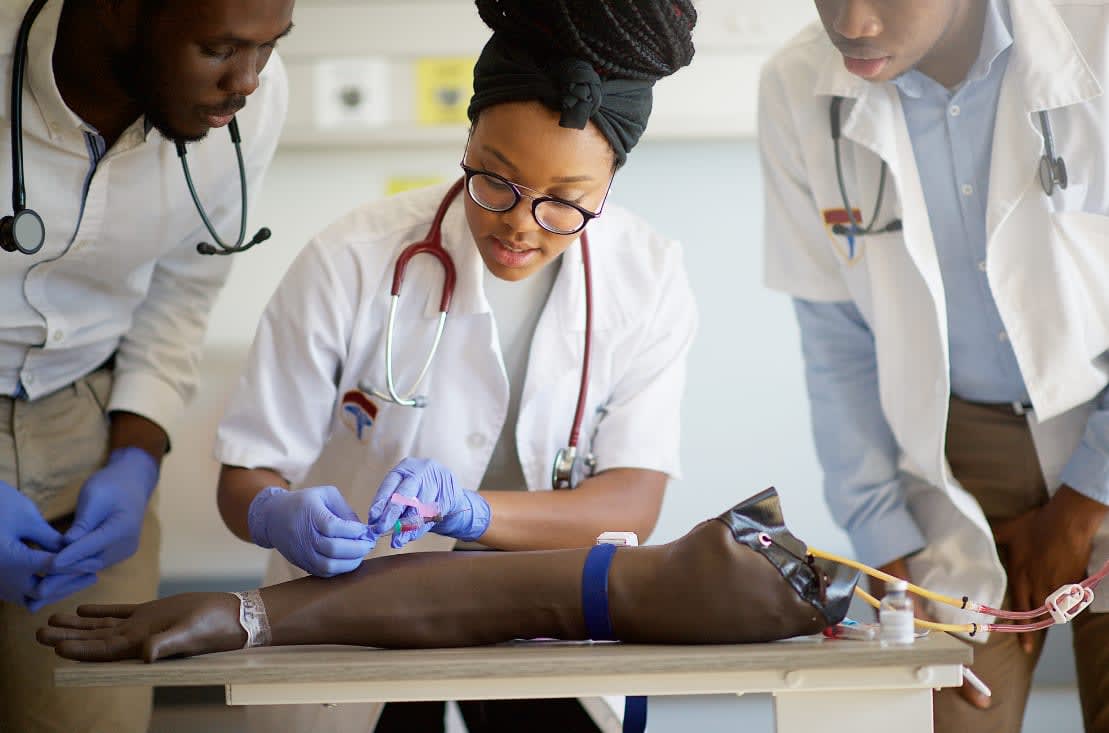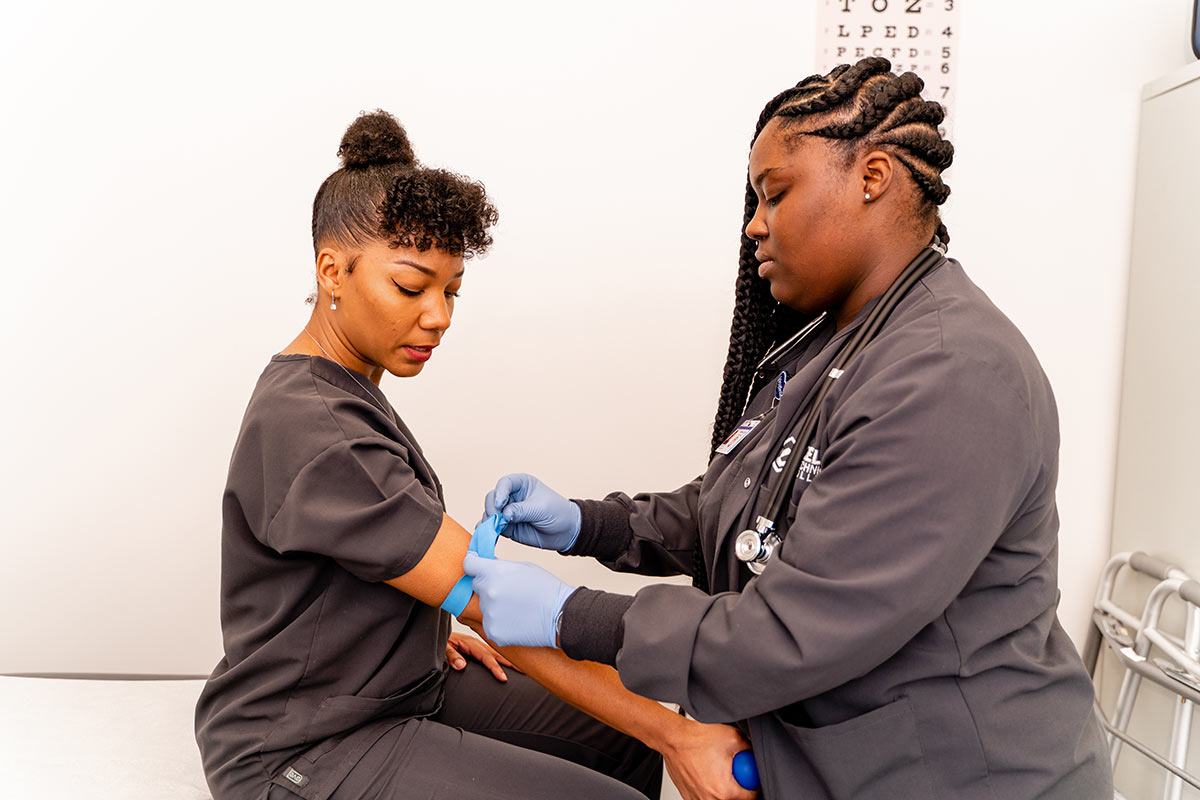Phlebotomy Classes Near Me: What Employers Look For
Wiki Article
The Path to Certification: Comprehending the Phlebotomy Training Course Journey and Its Significance
As you consider the course to accreditation in phlebotomy, it's essential to understand the function you'll play in health care. Your training will certainly cover necessary abilities, from blood collection strategies to patient communication.
The Function of Phlebotomists in Health Care
Phlebotomists play an important duty in the healthcare system, working as the essential web link in between clients and essential diagnostic screening. You'll perform blood draws, ensuring samples are accumulated precisely and securely. Your competence helps in identifying clinical conditions, checking health, and assisting treatment choices.In your day-to-day interactions, you'll need to establish trust fund with clients, making them really feel comfy during what could be a demanding experience. You are in charge of classifying and dealing with examples meticulously to avoid contamination or mistakes, which can affect examination outcomes.
Past this, you'll usually function together with doctors and registered nurses, communicating critical details about clients' problems. By mastering your abilities, you add meaningfully to individual care, making you a vital part of the medical group.
Review of Phlebotomy Training Programs
When discovering phlebotomy training programs, you'll discover different types made to fit various timetables and discovering styles. Each program aids you create necessary skills like blood collection and patient communication. Understanding these options is key to picking the ideal path for your career.Sorts Of Training Programs
Numerous kinds of training programs are available for those looking to end up being efficient in phlebotomy. Additionally, some healthcare facilities and facilities offer on-the-job training programs, supplying sensible experience while you learn. Whatever path you select, each program intends to outfit you with the essential skills for an effective phlebotomy career.
Secret Abilities Developed
Mastering phlebotomy requires a set of crucial abilities that are established with complete training programs. You'll discover technical skills like proper vein selection, needle insertion, and blood collection techniques. These hands-on practices guarantee you can perform treatments safely and successfully. In addition, interaction skills are basic; you'll need to interact with patients, discuss procedures, and placed them comfortable. Comprehending composition and physiology is critical, too, as it helps you situate capillaries and understand the body's response to blood draws. Ultimately, you'll acquire knowledge of safety methods and infection control, guaranteeing you maintain a clean and sterile setting. Each of these abilities is necessary for your success as a licensed phlebotomist, making you a valuable possession in any medical care setting.Secret Elements of a Phlebotomy Course
In a phlebotomy training course, you'll concentrate on necessary topics that lay the foundation for your future career. You'll involve in hands-on training that enables you to apply what you have actually found out in real-world settings. Both the core educational program and practical experience are crucial for your success as a phlebotomist.Core Educational Program Summary
While seeking a phlebotomy training course, you'll experience a curriculum designed to furnish you with fundamental skills and expertise. Phlebotomy school. This educational program typically includes composition and physiology, concentrating on the circulatory system and recognizing blood parts. You'll additionally discover various sorts of blood collection methods, including venipuncture and capillary puncture techniquesAdditionally, infection control and safety procedures are essential components, ensuring you know how to maintain a sterile environment. You'll study patient communication, stressing interaction and compassion, which are important for reducing person anxiety. Honest and legal considerations will be addressed, preparing you for real-world responsibilities. This fundamental expertise will certainly allow you to succeed as a phlebotomist and supply quality care in clinical setups.
Hands-On Training Experience
Obtaining hands-on experience is an important component of your phlebotomy training course. This functional training allows you to apply what you have actually learned in a real-world setting, boosting your abilities and confidence. Phlebotomy Training Course.Furthermore, you'll obtain the chance to engage with people, which is important for establishing your interaction skills. This combination of technological effectiveness and social skills is important for your success as a certified phlebotomist. Eventually, hands-on training is where concept fulfills technique, solidifying your knowledge and readiness for qualification.
Qualification and Licensing Requirements
Before you can begin your career in phlebotomy, it is crucial to recognize the certification and licensing requirements that vary by state. Many states need phlebotomists to hold an accreditation from an identified company, such as the National Phlebotomy Organization or the American Culture for Professional Pathology. These certifications normally entail passing an exam that evaluates your understanding and skills in the field.In addition to accreditation, some states have particular licensing requirements. You may need to finish a certain variety of hours in professional technique, submit evidence of training, or undertake a history check. It is necessary to investigate your state's guidelines to make certain you satisfy all needed Phlebotomy Courses Near Me requirements.
Remaining educated about these requirements not just aids you secure a position but also boosts your reliability as a specialist. By meeting these demands, you'll be well on your method to a successful job in phlebotomy.
Hands-On Training and Practical Experience
Hands-on training and functional experience are crucial elements of your phlebotomy education, as they permit you to use theoretical expertise in real-world circumstances. During your training, you'll involve in monitored venipuncture, find out appropriate techniques, and become acquainted with various blood collection tools. This straight involvement is critical for constructing your confidence and honing your abilities.You'll work carefully with skilled professionals that can guide you via the nuances of patient interaction and example handling. Each session not just strengthens your understanding but additionally prepares you for the hectic atmosphere of health care settings.
In addition, lots of programs incorporate scientific rotations, enabling you to experience varied settings, from hospitals to outpatient centers. This direct exposure helps you adapt to various challenges and individual demands, ensuring you're well-prepared for your future function. Welcome these chances, as they're necessary to ending up being a proficient and thoughtful phlebotomist.
Challenges Dealt With Throughout Training
While gaining hands-on experience is necessary, it is essential to identify the difficulties that can develop throughout your phlebotomy training. You might come across anxiousness when performing procedures on actual patients, especially if you're brand-new to the setting. The pressure to get every little thing right can be frustrating. Additionally, mastering the skills required for blood draws takes method; you might battle with technique at first.Time administration can likewise be an obstacle, as harmonizing theory, functional sessions, and individual commitments can really feel challenging. You may deal with varying finding out rates amongst your peers, resulting in feelings of self-doubt if you assume you're falling back. Adapting to the different individualities of teachers can be difficult, as each may have an unique teaching design.
Recognizing these obstacles early on can prepare you for success and help you create durability throughout your training journey.
Career Opportunities After Qualification

As you get experience, you might even think about concentrating on areas like pediatric or senior citizen phlebotomy, dealing with certain individual needs. Some phlebotomists select to advance their professions by ending up being laboratory professionals or going after additional education and learning in health care areas.
Additionally, your qualification can lead to functions in training or managing new phlebotomists, allowing you to share your knowledge. With the medical care industry continuously growing, your skills will certainly constantly be in demand, paving the means for a stable and fulfilling occupation. Embrace the possibilities awaiting you!
Frequently Asked Concerns
What Is the Normal Period of a Phlebotomy Training Course?
Phlebotomy training courses generally last around four to eight weeks. You'll engage in hands-on technique, class guideline, and on-line learning. Completing this training prepares you for qualification and a rewarding career in health care.Are Online Phlebotomy Courses Available?
Yes, on-line phlebotomy programs are readily available. They provide adaptability and benefit, enabling you to research at your own pace. Just validate the program is certified to fulfill certification needs and acquire beneficial abilities for your job.Just How Much Does Phlebotomy Training Generally Expense?
Phlebotomy training normally sets you back between $700 and $2,500, depending upon the program and area. You ought to take into consideration aspects like course size, included products, and hands-on experience when picking the best training for you.What Prevail Prerequisites for Phlebotomy Training?
Typical requirements for phlebotomy training commonly include a senior high school diploma or GED, booster shots, and a background check. Some programs might also need standard health care expertise or certifications, guaranteeing you're prepared for hands-on training.Can I Work While Finishing My Phlebotomy Training?
Yes, you can work while completing your phlebotomy training. Several students balance work with their studies, however make particular to manage your time successfully to assure you meet both work and training dedications successfully.Report this wiki page